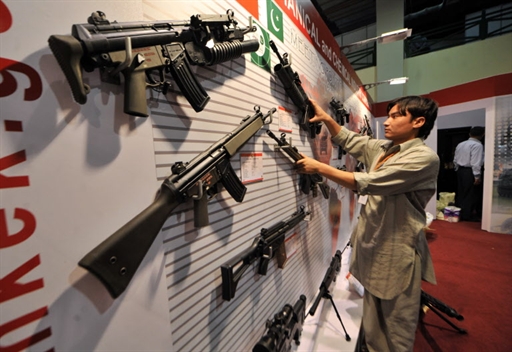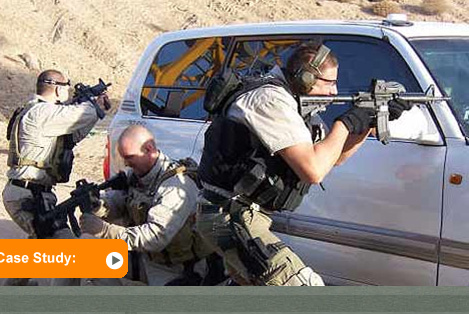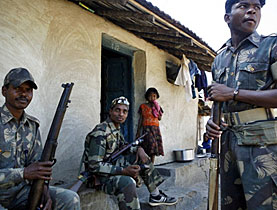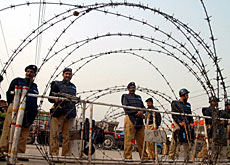Swiss arms industry demands more ammunition

The Swiss defence industry says restrictive export laws introduced two years ago have put it at a disadvantage compared to manufacturers in other European countries.
Exports were down in the first half of this year, which some parliamentarians say is the result of banning sales to countries involved in armed conflict or which “systematically and severely violate human rights”.
Centre-right parliamentarians Bruno Frick (Christian Democrat) and Sylvie Perrinjaquet (Radical Party) have both submitted motions to cabinet asking it to compare Swiss arms exports law with other countries and to present proposals to eliminate any disadvantages.
Weapons and munitions exports were 12 per cent lower in the first half of 2010 compared with the same period in 2009. However, the SFr 728 million ($725 million) worth of arms sold abroad last year was a record high. The figure was an 0.8 per cent increase on 2008, which itself was a 55 per cent rise on 2007.
But Frick and Perrinjaquet, as co-presidents of a lobby group for the defence industry, say manufacturers are being unfairly punished. They point to planned sales in the spring of 2009 to Egypt, Saudi Arabia and Pakistan that had to be scrapped due to the revision of the law.
Economic survival
The goal of the lobby group, Committee for Security and Defence Technology, is to convince the government to put in place a regulatory framework that contributes to the economic survival of arms manufacturers, both state-owned and private.
The cabinet has admitted that there are differences between Switzerland’s authorisation policy and that of other European governments, and therefore has agreed to look into the motions of Frick and Perrinjaquet.
By doing so, the government has reinforced statements made by Economics Minister Doris Leuthard last year ahead of a nationwide vote on a ban of all weapons exports.
Campaigning against the ban (which was rejected at the ballot box), Leuthard said Swiss arms exports policy was already “restrictive”. And she said Switzerland would continue to analyse carefully each and every request to sell arms abroad.
Self defence
Frick rejects accusations that he wants Swiss firms to be able to sell weapons to countries involved in armed conflict or where human rights abuses are common.
“Switzerland would only be able to deliver to countries where the weapons will be used for defence purposes, and where human rights are respected. The export of defence technology contributes to security and self defence,” Frick said.
Asked by swissinfo.ch whether Switzerland would still be taking its responsibility seriously if it were to look into revising its policy for countries like Pakistan, Frick said: “I didn’t say we must sell to Pakistan. I’m only asking that the cabinet compares its export laws with the European Union and clarifies if any disadvantages are justified.”
However, a press release from Frick and Perrinjaquet’s lobby group says the criteria that excludes arms exports of all kinds to blacklisted countries should be lifted, because the revised law also prevents the sale of “uncontroversial and unproblematic” goods.
Frick also argues that there are different interpretations of what constitutes a human rights abuse. Even Switzerland has been criticised by the European Court of Human Rights, he added. “It depends on the severity and regularity of the abuses.”
Not surprisingly, the prominent pacifist organisation, Group for Switzerland without an Army (GSoA), is opposed to the latest efforts to give the arms lobby more ammunition.
“Since the debate about arms exports is no longer in the headlines, there are moves to allow the weapons industry to do anything it wants – to the extent of exporting to states with poor human rights records,” said Tom Cassee of GSoA.
According to Cassee, Switzerland is the European leader, per capita, when it comes to arms exports, particularly those to Pakistan.
Pakistan
Pakistan was the main target of Swiss exports in 2008, but then fell to 30th place last year after the new restrictions came into force. However, the South Asia nation has climbed back to eighth position this year thanks to deliveries of munitions and replacement parts for air defence systems, which are exempted from the ban.
Cassee dismisses the motions by Frick and Perrinjaquet – and the cabinet’s reaction to them – as “completely irresponsible”. He says weapons are already exported to countries like Pakistan where it is not known whether they are falling into the hands of Taliban. “It’s important [to the arms lobby] that weapons are delivered, regardless of who is killed by them.”
Simon Plüss, head of the export controls division of the State Secretariat for Economic Affairs (Seco), disagrees. “Arms exports to Pakistan are approved, but only very reluctantly,” he said, explaining that this was limited to air defence systems.
Plüss says it is too early to come to any conclusions about the cabinet’s decision to follow up the parliamentary motions. But he added that now – two years after the updated arms export law came into force – was a good time to review authorisation procedures.
War materials cannot be exported to countries involved in an internal or international armed conflict, or those systematically and seriously violating human rights.
No sales are allowed to developing states that also receive development assistance or if there is a strong risk that weapons will be used against civilians or sold to another destination.
The Group for Switzerland without an Army feels that these restrictions are inadequate and do not prevent weapons that are manufactured in Switzerland from being used in countries at war.
Economics Minister Doris Leuthard fought against a 2009 initiative to ban all weapons exports. She argued that Swiss technical innovation was at stake in addition to the industry’s 5,100 jobs.
In 2009 Switzerland exported arms worth a record SFr728 million to more than 70 countries.
(adapted from German by Dale Bechtel)

In compliance with the JTI standards
More: SWI swissinfo.ch certified by the Journalism Trust Initiative




You can find an overview of ongoing debates with our journalists here . Please join us!
If you want to start a conversation about a topic raised in this article or want to report factual errors, email us at english@swissinfo.ch.